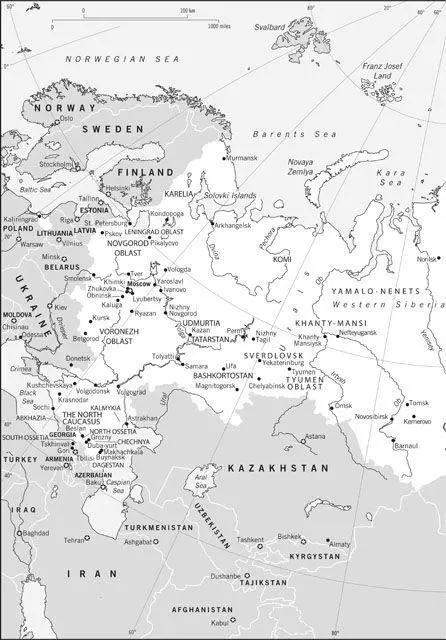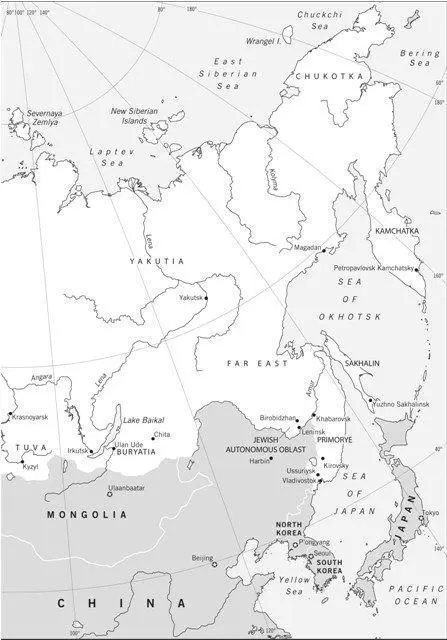Ben Juda
FRAGILE EMPIRE
How Russia Fell in and Out of Love With Vladimir Putin
For my mother
with love and thanks
Two hundred years ago the historian Nikolai Karamzin visited France. Russian émigrés there asked him, ‘What is happening back home, in two words?’ Karamzin didn’t need two words. ‘Stealing,’ he replied. And they really are stealing. On a broader scale every year. People carry off beef carcasses from meatpacking plants. Carders from textile factories. Lenses from photographic firms. They swipe everything – tile, gypsum, polythene, electric motors, bolts, screws, radio tubes, thread, glass. Often this takes on a metaphysical character. I’m talking about the completely mysterious thefts without any rational goal. This can only happen within the Russian state – of that I’m convinced.
Sergei Dovalatov,
The Suitcase (1986)

IN RUSSIA, my first and foremost thanks are to Yekaterina, Oleg and Anton Zykov. Your hospitality was the one thing that allowed me to spend enough time in Moscow to begin to understand Russia. I am deeply grateful. Polina Eremenko was the hand that pulled this project together, organizing the meetings, trips and interviews that make it come to life. I cannot thank her enough. In becoming a reporter, my thanks go to Ilya Arkhipov, who has been a mentor in showing me how to cover Russia since we met in the mayhem of a collapsing Kyrgyzstan. By no means least, I want to thank Garrett Pappas. Had it not been for his hospitality, I would not have been able to cover the winter protest movement and its fate the year Putin returned. It is truly appreciated.
In Britain, I want to thank my mother Rosie Whitehouse not only as an editor, but the one who inspired me from an early age to travel and learn about Russia. No one could have helped me more, or taught me more about writing. Then, my father Tim Judah, for always being there and showing me in a hundred little ways how to be a real journalist. They add up to everything. My brother and sisters have lived with this project and the obsessions it entailed for a long time. Their kindness and tolerance helped make it happen. I also want to thank Claire Judah, Mary Gilbert and Marion Judah for helping me get started.
I want to thank all those who have helped me reach this point. Dan Perry, who helped me get to Moscow, Daniel Johnson, who sent me around Russia, and Daniel Korski, who brought me into the European Council on Foreign Relations and inspired me to aim for analysis. Above all, Nicu Popescu, whose enthusiasm made him the best teacher I ever had. I am indebted to Elena Gnedina for carefully reading and commenting on this manuscript. All along the way Edward Lucas was a source of constant encouragement and invaluable guidance. I am deeply thankful to Phoebe Clapham and Robert Baldock for taking this gamble. Without them, this book would not be here.
Amongst my friends, James Schneider helped me formulate my ideas by always knowing what the right questions were to ask over the years. This book began in those conversations. Dylan Chadha had an uncanny ability to point my thoughts in the right direction. Max Seddon never failed to share his time or brilliant observations as this came together. Theo Gibbons was a constant source of support. David Patrikarakos was always there when I needed advice. Special thanks go to William Rice, for sharing not only analytical notes but also meetings, and with whom conversations in the Scarsdale Tavern were as important to the thinking of this book as they were to the reporting. I am extremely grateful.
London, December 2012
INTRODUCTION
THE WEAKEST STRONGMAN
THINGS LIKE this were not supposed to be happening anymore. In November 2010, a Russian family were celebrating in their new, proud brick house on Green Street. They were successful people, farmers, and this was a quiet town called Kushchevskaya on the fertile black earth plains of the south. There was much to fete: they were together, on National Unity Day, and the new baby not yet a year old. As they gathered round the table for a toast, their guard dog outside was shot with a tranquilizer dart. Right then, the house was broken into. Eleven armed men pushed in. They began to kill everyone. First they went for the men, then the women and children. They strangled and stabbed them. Soon there were twelve bodies around the dining table, four of them children. They doused the bodies in petrol and set them alight. As they fled, they threw the bodies on top of the nine-month-old baby and left her screaming in the flames, to choke on the smoke. Afterwards they went to the local fast-food joint for a beer as if nothing had happened.
The provincial governor shrugged. ‘Unfortunately, on some levels, such gangs exist in every region and in every city.’ 1
He was right. These were very ordinary Russian criminals. They were not only psychopaths, but bandits who, in hock with officials, had infested the state. Their boss was not an outlaw. His name was Sergey Tsapok and he was the law – a member of the local council, tied to the tax agencies, the regular police and the prosecutor, let off from offences by these authorities over a hundred times. He liked to boast that he had been a guest at the President’s inauguration in the Kremlin. He was there to watch the children being strangled.
The murders horrified Russia, because they smelt of something worse than murdered children – a rotting state. The dead farmer had been trying to resist Tsapok’s demands for a feudal ‘tribute’. He was standing up to the extortion racket that Tsapok imposed on those weaker than him across the area. The state, permeated by the mafia, could do nothing to protect him. Back in Moscow, the government tried to find out what had happened, to calm a hysterical gutter press, but found nobody at the end of the line whom it could trust to tell the truth. None of the local bureaucrats was untainted. The circumstances were so suspicious and the state so weak that the Kremlin had no choice but to send the chief prosecutor himself to run the investigation ‘manually’ on site.
Vladimir Putin was forced to admit that in Kushchevskaya ‘all the organs of power have failed’. 2But this was no isolated incident. These were only the latest victims of Putin’s failure. He had promised to end the ‘wild 1990s’ with what he called a ‘dictatorship of law’ and a ‘vertical of power’. Yet his stability had turned out to be corrosive. His statement was an admission that the corruption and lawlessness of the 1990s had not gone away. The great and the good, like Valery Zorkin, the chief justice of the constitutional court, were horrified. ‘One has to admit, honestly, that the disease of organized crime has too deeply infected our country,’ he wrote. ‘If the mafia isn’t pushed back it will raise the question of whether Russia can survive beyond the next ten years.’ 3
This book asks how such a murder can still happen in twenty-first-century Russia. To find the answer, it shines the interrogator’s lamp not just on Putin’s face but on the nation and his system as a whole. This is a study of Putin’s triumph as a politician and his failure to build a modern state. This book asks what is wrong with Putin’s Russia – how such a weak state manages to steal so much from its people, and why they allow it to do so. Previous books have told the story of the rise of the Putin system; this one aims to start telling the story of its decay. It explores how botched state building created neither a ‘dictatorship of law’ nor a ‘vertical of power’ but sowed the seeds for the slow disintegration of Putin’s once unchallengeable popularity.
Читать дальше















